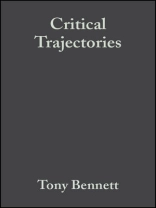Critical Trajectories: Culture, Society, Intellectuals brings together for the first time writings from one of the leading figures in cultural studies — Tony Bennett.
The selections in the volume span the period from the late 1970s to the present, representing issues of enduring concern in Bennett’s work over this period and throughout his wide-ranging intellectual career.
* Charts the extensive influence of Bennett’s thinking across the humanities and social sciences – from cultural history to museums and memory, and from Bond and popular culture to cultural policy and governance
* Tackles some of the most important subjects in cultural studies, including aesthetics, textuality, the intellectual, and the role of cultural history
* Includes a new introductory essay pinpointing Bennett’s concerns in changing intellectual and political contexts
Innehållsförteckning
Acknowledgements.
Introduction.
Part I: The literary and the aesthetic.
1. Severing the aesthetic connection.
2. Texts, readers and reading formations.
3. Figuring audiences and readers.
Part II: Culture, governance and the social.
4. Culture and governmentality.
5. Acting on the social: art, culture, and government.
Part III: Museums as civic machineries.
6. Archaeological autopsy: objectifying time and cultural
governance.
7. Civic seeing: museums and the organisation of vision.
Part IV: Intellectuals, culture, politics.
8. Intellectuals, culture, policy: the technical, the practical
and the critical.
9. The historical universal: the role of cultural value in the
historical sociology of Pierre Bourdieu.
Selected Bibliography.
References.
Index
Om författaren
Tony Bennett is Professor of Sociology at the Open University, where he is a Director of the ESRC Centre for Research on Socio-cultural Change jointly managed by the Open University and the University of Manchester, and a Professorial Fellow in the School of Culture and Communications at the University of Melbourne. Bennett’s work encompasses sociology, cultural studies, museum theory, and cultural history.












